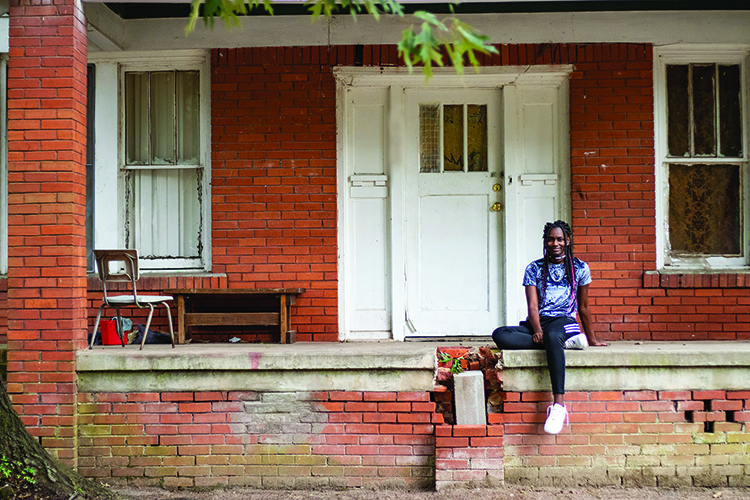Moving on to brighter days
Junior finds light in dark circumstances
Photo by Margaret Debenport
Sitting outside her home in Beverly, junior Dashanae Criner reflects on how she has overcome the time she spent in a homeless shelter and being bullied. “I went from thinking I was worthless in the world to thinking I probably do have a purpose in the world,” Criner said.
September 29, 2019
Weathered brick contains weathered people. Missing door knobs make for missing pride. Tattered appearance expresses the secrets behind the mossy four walls crumbling from within. On the edge of Beverly, sits a run down house of five. The residence maintains an influx of others in and out everyday. Beneath this roof is a room adorned with black floors and white walls, the parallels giving the girl inside a cozy feeling.
This room belongs to junior Dashanae Criner. Criner spends most of her day there enjoying her time alone, which she never had up until just a few years ago. After at least six months of living in a homeless shelter, Criner moved into a three bedroom house with her family of six, where she and both of her sisters shared a room.
“We had our own room, it had bunk beds and an extra mattress since we had so many people,” Criner said.
After leaving the homeless shelter, her family moved into the house in Beverly.
“I grew up in a single mother household with my siblings, my grandma and my aunt who needed a place to stay,” Criner said. “My family was in poverty and my mom was working herself to the bone to provide for everyone’s needs.”
Because her family’s former financial situation, Criner couldn’t afford new clothes or dinner some nights.
“I thought that how I lived was normal, that everyone’s [home life] was like mine,” Criner said. “I didn’t realize I was poor until kids at school started to bully me.”
Criner endured many years of being taunted, the names that people would call her are stuck in her mind forever.
“Being a dark skinned girl, I had to deal with people calling me ‘burnt’ or a ‘monkey,’” Criner said. “Even my little sister would call me those names.”
Criner’s mother worked all the time and her other family members had their own focuses, so she relied only on herself to make it through the bullying.
“I was too afraid to talk about [my problems] at home because my family already had too much on their plate never really paid attention to me, so I kept [everything] to myself,” Criner said.
Criner’s self esteem got lower and lower as she grew older.
“As the bullying continued, I started to feel more like trash everyday,” Criner said. “As the years went by, my self-esteem hit rock bottom.”
At the end of the day, Criner’s biggest role model is her mother Tanika Criner.
“Seeing how hardworking my mom is, I was determined to work hard just like she does,” Criner said. “I worked on my depression and anxiety for her.”
Criner’s mother found a new job and a better lifestyle for them. As a higher income came in, Criner was fortunate to trade in her hand me downs and reliance on school lunches for a more conventional household.
“After my mom got a new job, I got new clothes,” Criner said. “I didn’t have to worry about not knowing when my next meal was.”
Her oldest sister, aunt and grandma moved out which cleared a lot of space in the cramped home. Having her own room meant more time to herself.
“Being alone made me look at myself more,” Criner said. “Everyday I would look in the mirror and find something I liked about myself, and I would compliment that area for the rest of the day.”
As the bullying faded out, new friendships faded in.
“In eighth grade I made friends with these really great people, they would check up on me all the time,” Criner said. “They made me feel loved and I guess that was the boost I needed.”
After living in Beverly for so long, Criner has learned a lot about her future and the people around her.
“Being a young black person I have to work harder than others to get a good future, everyone in Beverly does. We have to do good in school or sports if we want to get out, so that’s what I’m doing,” Criner said. “I take DC and AP classes to keep myself at the top, it’s stressful but it’s worth it.”
After a decade of living in the house Criner has learned to love where she lives and be thankful for what she has.
“I’ve been living in that house for around 10 years, and it feels good. It represents our growth,” Criner said. “Living in Beverly I see that not everybody’s life is perfect and everybody has a story of their own.”
Though sometimes her setting still brings her down, she still maintains sentimental feelings towards it.
“I’d be lying if I said I didn’t think of it as home,” Criner said. “I’d rather be there than any other place.”
















